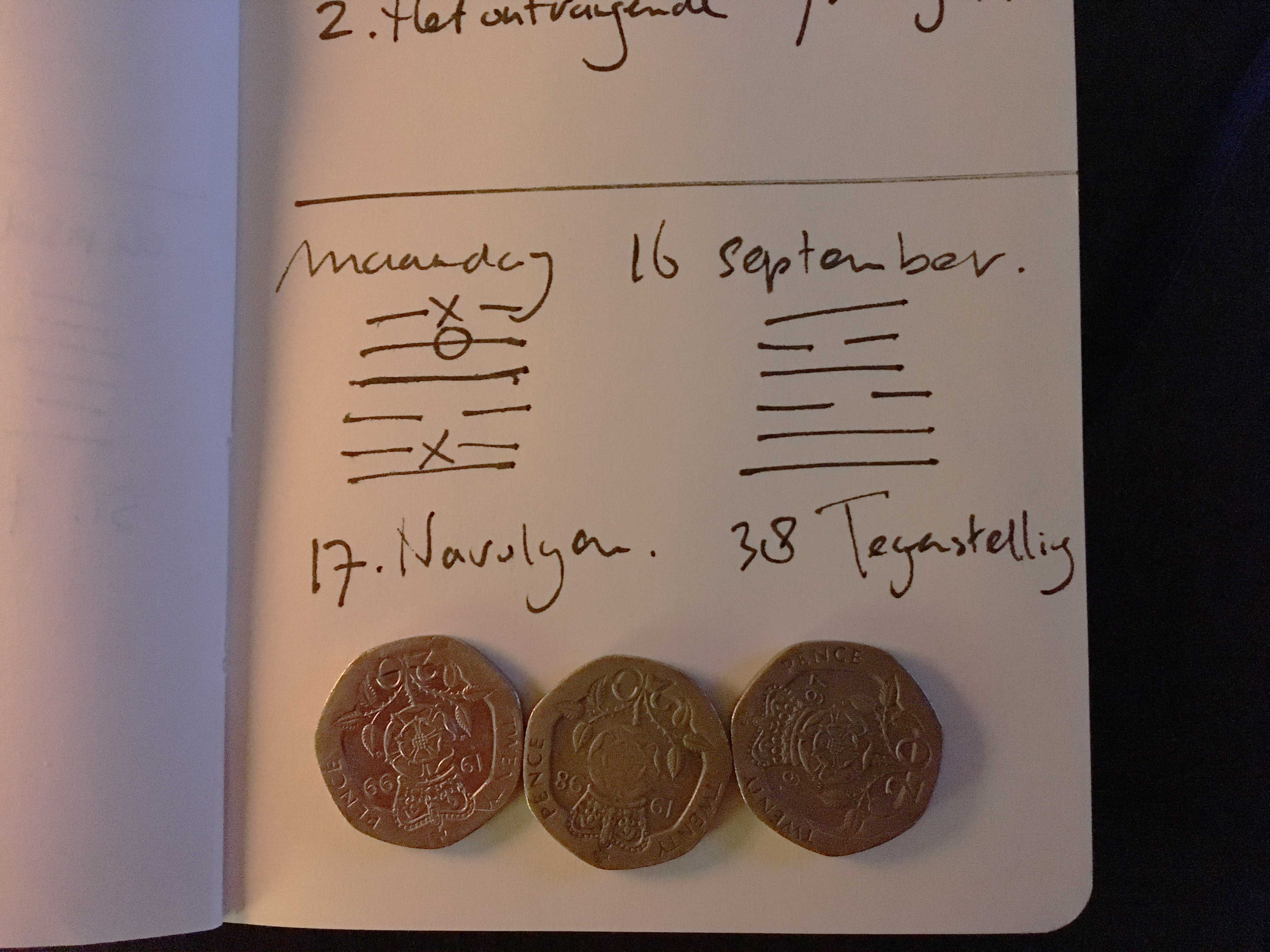
Opposition
above TUI THE JOYOUS, LAKE
below CHêN THE AROUSING, THUNDER
The trigram Tui, the Joyous, whose attribute is gladness, is above; Chên, the Arousing, which has the attribute of movement, is below. Joy in movement induces following. The Joyous is the youngest daughter, while the Arousing is the eldest son. An older man defers to a young girl and shows her consideration. By this he moves her to follow him.
THE JUDGMENT
FOLLOWING has supreme success.
Perseverance furthers. No blame.
In order to obtain a following one must first know how to adapt oneself. If a man would rule he must first learn to serve, for only in this way does he secure from those below him the joyous assent that is necessary if they are to follow him. If he has to obtain a following by force or cunning, by conspiracy or by creating faction, he invariably arouses resistance, which obstructs willing adherence. But even joyous movement can lead to evil consequences, hence the added stipulation, “Perseverance furthers” –that is, consistency in doing right– together with “No blame.” Just as we should not ask others to follow us unless this condition is fulfilled, so it is only under this condition that we can in turn follow others without coming to harm.
The thought of obtaining a following through adaptation to the demands of the time is a great and significant idea; this is why the appended judgment is so favorable.
THE IMAGE
Thunder in the middle of the lake:
The image of FOLLOWING.
Thus the superior man at nightfall
Goes indoors for rest and recuperation.
In the autumn electricity withdraws into the earth again and rests. Here it is the thunder in the middle of the lake that serves as the image–thunder in its winter rest, not thunder in motion. The idea of following in the sense of adaptation to the demands of the time grows out of this image. Thunder in the middle of the lake indicates times of darkness and rest. Similarly, a superior man, after being tirelessly active all day, allows himself rest and recuperation at night. No situation can become favorable until one is able to adapt to it and does not wear himself out with mistaken resistance.
Six in the second place means:
If one clings to the little boy,
One loses the strong man.
In friendships and close relationships an individual must make a careful choice. He surrounds himself either with good or with bad company; he cannot have both at once. If he throws himself away on unworthy friends he loses connection with people of intellectual power who could further him in the good.
°Nine in the fifth place means:
Sincere in the good. Good fortune.
Every man must have something he follows–something that serves him as a lodestar. He who follows with conviction the beautiful and the good may feel himself strengthened by this saying.
Six at the top means:
He meets with firm allegiance
And is still further bound.
The king introduces him
To the Western Mountain.
This refers to a man, an exalted sage, who has already put the turmoil of the world behind him. But a follower appears who understands him and is not to be put off. So the sage comes back into the world and aids the other in his work. Thus there develops an eternal tie between the two.
The allegory is chosen from the annals of the Chou dynasty. The rulers of this dynasty honored men who had served them well by awarding them a place in the royal family’s temple of ancestors on the Western Mountain. In this way they were regarded as sharing in the destiny of the ruling family.
above LI THE CLINGING, FLAME
below TUI THE JOYOUS, LAKE
This hexagram is composed of the trigram Li above, i.e., flame, which burns upward, and Tui below, i.e., the lake, which seeps downward. These tow movements are indirect contrast. Furthermore, LI is the second daughter and Tui the youngest daughter, and although they live in the same house they belong to different men; hence their wills are not the same but are divergently directed.
THE JUDGMENT
OPPOSITION. In small matters, good fortune.
When people live in opposition and estrangement they cannot carry out a great undertaking in common; their points of view diverge too widely. In such circumstances one should above all not proceed brusquely, for that would only increase the existing opposition; instead, one should limit oneself to producing gradual effects in small matters. Here success can still be expected, because the situation is such that the opposition does not preclude all agreement.
In general, opposition appears as an obstruction, but when it represents polarity within a comprehensive whole, it has also its useful and important functions. The oppositions of heaven and earth, spirit and nature, man and woman, when reconciled, bring about the creation and reproduction of life. In the world of visible things, the principle of opposites makes possible the differentiation by categories through which order is brought into the world.
THE IMAGE.
Above, fire; below. The lake.
The image of OPPOSITION.
Thus amid all fellowship
The superior man retains his individuality.
The two elements, fire and water, never mingle but even when in contact retain their own natures. So the sutured man is never led into baseness or vulgarity through intercourse or community of interests with persons of another sort; regardless of all commingling, he will always preserve his individuality.